
Our Programs

Our Programs
Sequential Intercept Model
Basis for LA County’s re-imagining of the justice system & push
to more community-based, upstream prevention
Sequential Intercept Model
Basis for LA County’s re-imagining of the justice system
& push to more community-based, upstream prevention
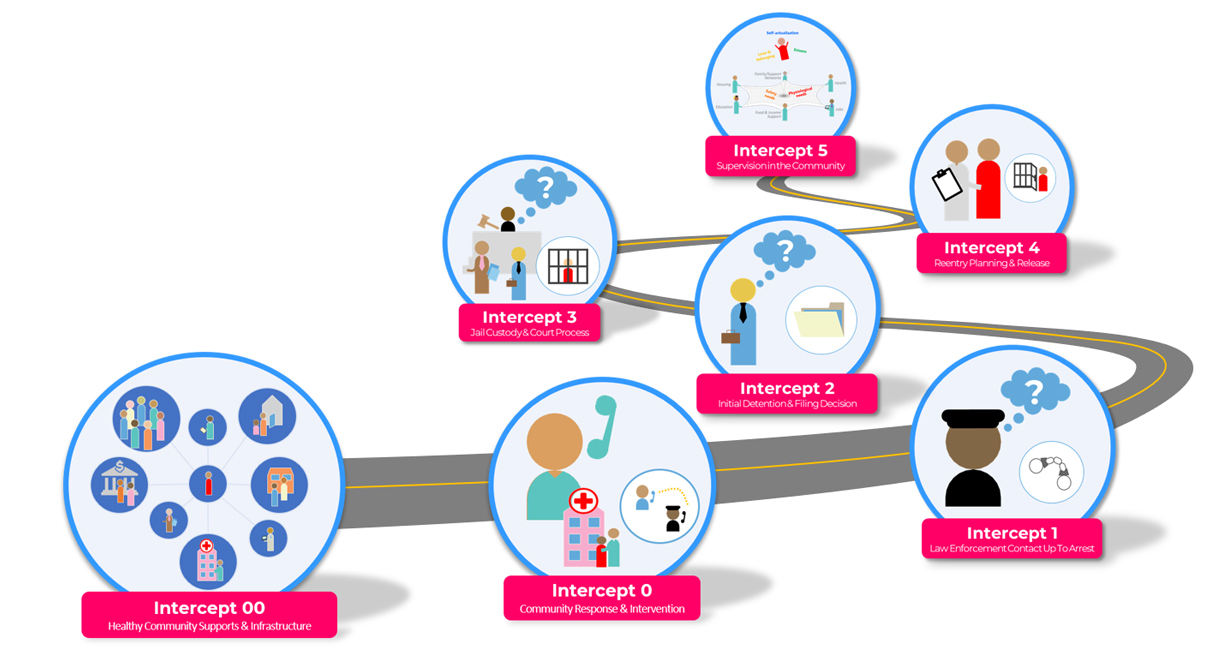
Prevention Services
Intercept 00
Healthy Community
Reports & Infrastructure
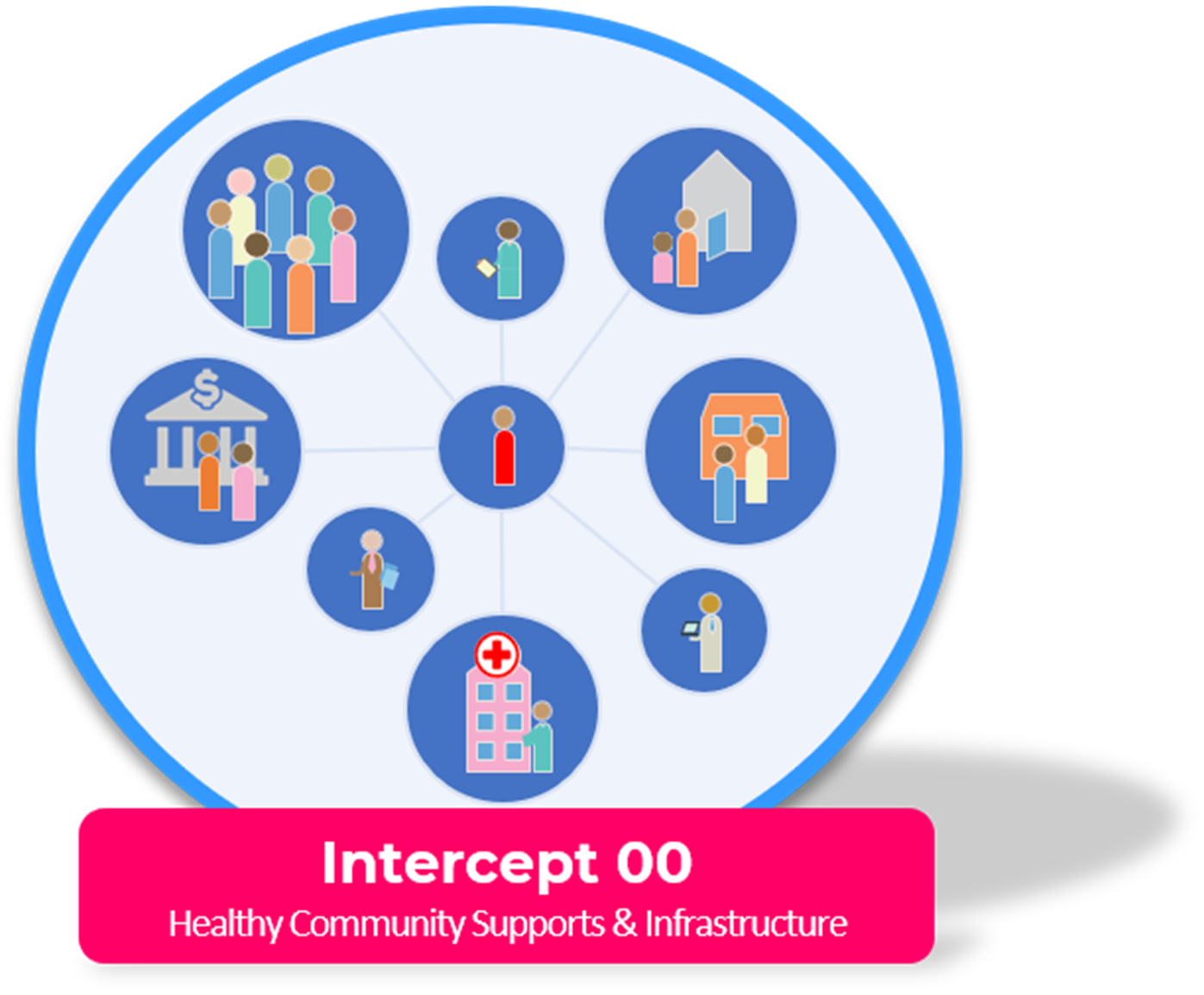
What Is Intercept 00?
Intercept 00 encompasses community-based responses & support programs addressing or preventing the underlying problems that increase likelihood of justice system involvement: poor mental or physical health, homelessness, poverty, trauma, unemployment, and more.
What are the Solutions?
Solutions include government investment in robust community-based systems of care, social supports, housing and anti-poverty initiatives.
LA County Initiatives
Care First, Community Investment (aka “Measure J”)
Care First Community Investment (CFCI)
The Board of Supervisors has committed to advancing Care First, Jails Last and CFCI is a significant investment to achieve that vision. Click the link below to learn more about CFCI and view the approved Spending Plans for Years 1 and 2.
Prevention Services
Intercept 00
Healthy Community
Reports & Infrastructure

What Is Intercept 00?
Intercept 00 encompasses community-based responses & support programs addressing or preventing the underlying problems that increase likelihood of justice system involvement: poor mental or physical health, homelessness, poverty, trauma, unemployment, and more.
What are the Solutions?
Solutions include government investment in robust community-based systems of care, social supports, housing and anti-poverty initiatives.
LA County Initiatives
Care First, Community Investment (aka “Measure J”)
Care First Community Investment (CFCI)
The Board of Supervisors has committed to advancing Care First, Jails Last and CFCI is a significant investment to achieve that vision. Click the link below to learn more about CFCI and view the approved Spending Plans for Years 1 and 2.
What Is Intercept 0?
Intercept 0 is considered a gate-keeper to formal interaction with the criminal justice system and focuses on non-law enforcement (“pre-police”) interventions for people with mental health or substance use challenges before they are arrested.
The Goal
Here, the goal is to de-escalate behavioral crises and avoid a police response altogether, thereby preventing any collateral consequences of a police encounter, arrest, conviction and/or incarceration.
LA County Initiatives
Alternative Crisis Response (co-chair with Department of Mental Health)
Prevention Services
Intercept 0
Community Response
& Intervention
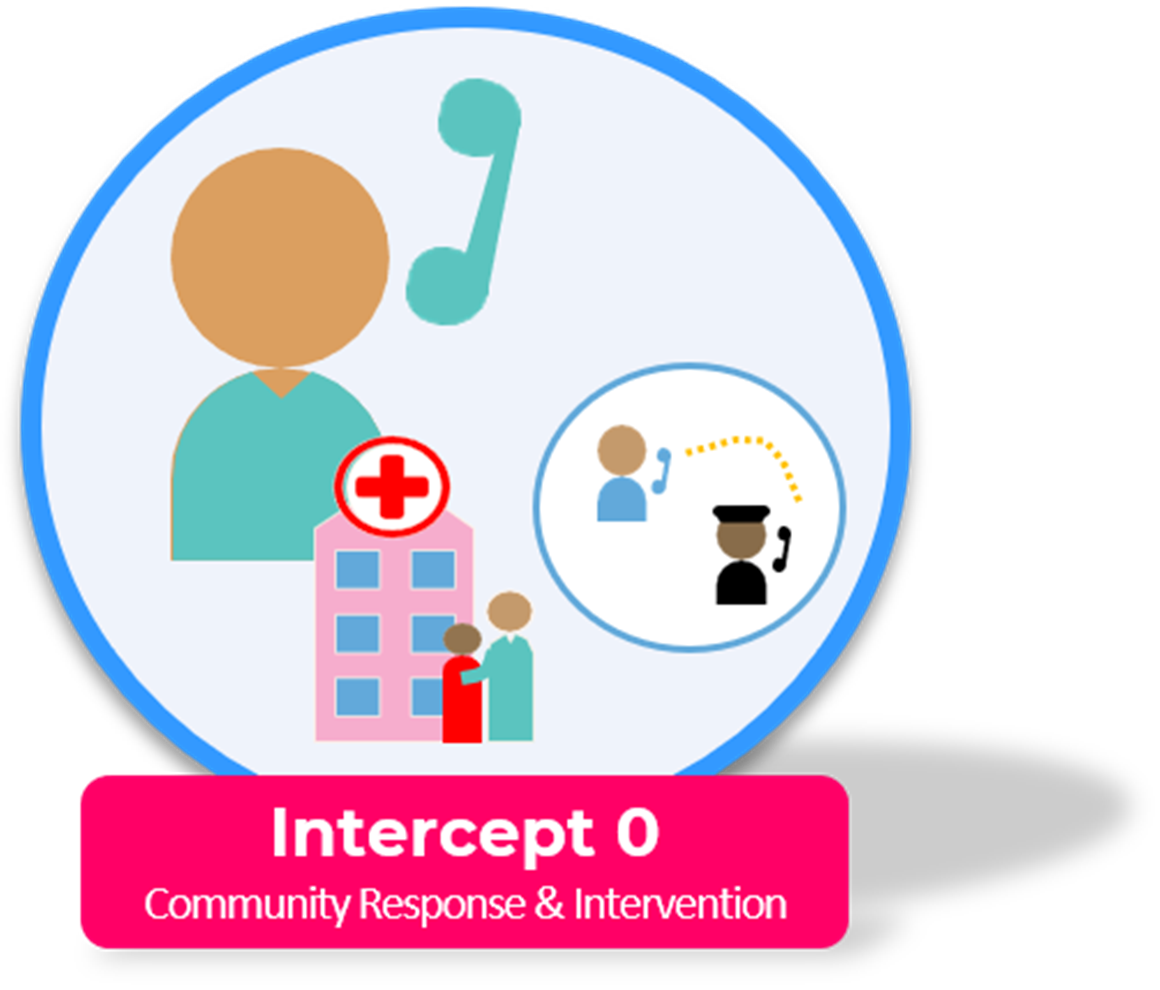
Prevention Services
Intercept 0
Community Response
& Intervention

What Is Intercept 0?
Intercept 0 is considered a gate-keeper to formal interaction with the criminal justice system and focuses on non-law enforcement (“pre-police”) interventions for people with mental health or substance use challenges before they are arrested.
The Goal
Here, the goal is to de-escalate behavioral crises and avoid a police response altogether, thereby preventing any collateral consequences of a police encounter, arrest, conviction and/or incarceration.
LA County Initiatives
Alternative Crisis Response (co-chair with Department of Mental Health)
Pretrial Services
Intercept 1
Law Enforcement
Contact Up to Arrest
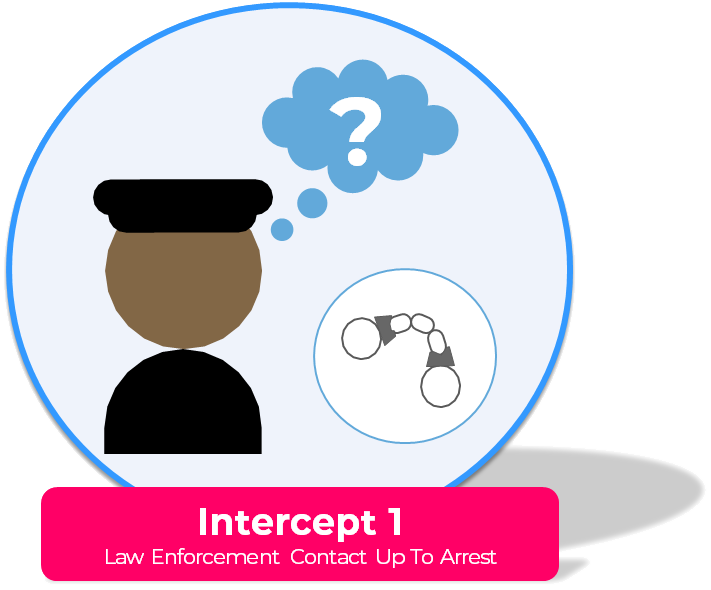
What Is Intercept 1?
Intercept 1 is centered around police-led interventions at the “pre-arrest” stage that help individuals avoid the consequences of arrest and booking.
Diversion Programs
Diversion programs in this intercept empower law enforcement to avoid unnecessary arrests for low-level offenses and instead refer individuals to services.
Example LA County Initiatives (not exhaustive)
- Law Enforcement Assisted Diversion, aka LEAD (Office of Diversion & Reentry)
- LA Door (LA City Attorney)
- Homeless Liaison Program (Santa Monica PD)
Pretrial Services
Intercept 1
Law Enforcement
Contact Up to Arrest

What Is Intercept 1?
Intercept 1 is centered around police-led interventions at the “pre-arrest” stage that help individuals avoid the consequences of arrest and booking.
Diversion Programs
Diversion programs in this intercept empower law enforcement to avoid unnecessary arrests for low-level offenses and instead refer individuals to services.
LA County Initiatives (not exhaustive)
- Law Enforcement Assisted Diversion, aka LEAD (Office of Diversion & Reentry)
- LA Door (LA City Attorney)
- Homeless Liaison Program (Santa Monica PD)
What Is Intercept 2?
Intercept 2 focuses on prosecutor-led “post-arrest” diversion options, with prosecuting agencies offering the chance to postpone filing charges in exchange for individuals voluntarily completing a treatment program or fulfilling some other set of requirements.
Type of Diversion
This type of diversion is also described as “pre-filing”
(before the prosecutor files formal charges).
Prefiling Diversion (PFD)
ATI Prefiling Diversion Program diverts individuals detained for non-serious/non-violent misdemeanors and felonies to community supports, in lieu of criminal charges being filed (which could entail prosecution and jail time).
Pretrial Services
Intercept 2
Initial Detention
& Filing Decision
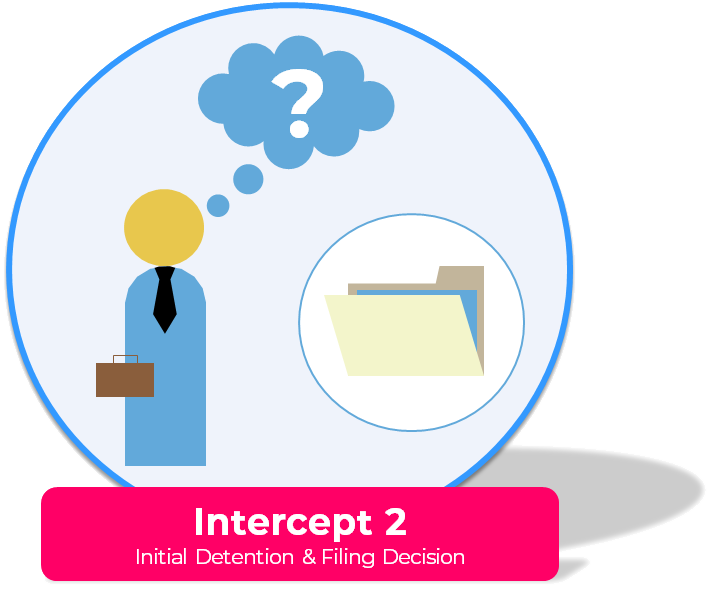
Pretrial Services
Intercept 2
Initial Detention
& Filing Decision

What Is Intercept 2?
Intercept 2 focuses on prosecutor-led “post-arrest” diversion options, with prosecuting agencies offering the chance to postpone filing charges in exchange for individuals voluntarily completing a treatment program or fulfilling some other set of requirements.
Type of Diversion
This type of diversion is also described as “pre-filing”
(before the prosecutor files formal charges).
Prefiling Diversion (PFD)
ATI Prefiling Diversion Program diverts individuals detained for non-serious/non-violent misdemeanors and felonies to community supports, in lieu of criminal charges being filed (which could entail prosecution and jail time).
Pretrial Services
Intercept 3
Jail Custody & Court Process
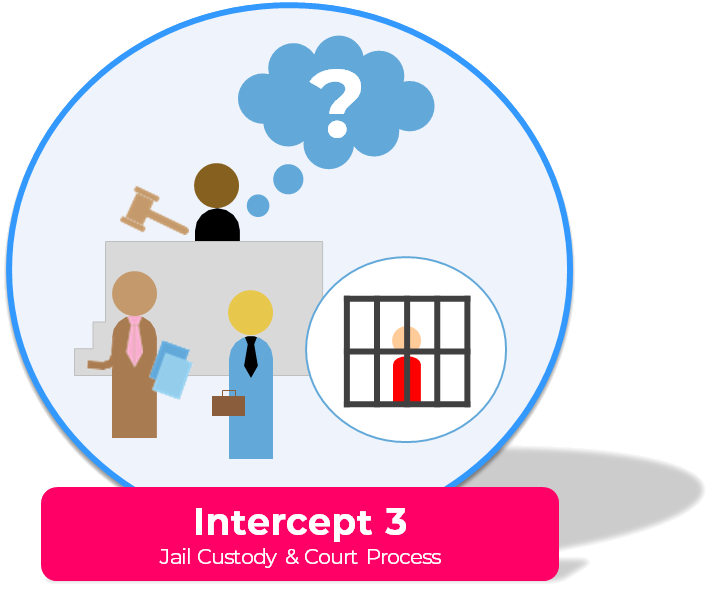
What Is Intercept 3?
If the prosecutor proceeds with the case and files charges, intervention now becomes a collaborative court-led effort at Intercept 3. Though the decision ultimately lies with the judicial officer, ideally the prosecution, defense and judge all agree to defer further proceedings “pre-trial” and allow individuals to avoid any further incarceration – in exchange for completing court-ordered treatment and/or obligations in 1 of 3 ways:
1) Pre-plea:
Pre-plea: without conviction (pleading guilty/no contest)
– with case dismissed upon successful completion of treatment.
2) Post-plea:
Post-plea: after conviction (pleading guilty/no contest)
– with plea then withdrawn & case dismissed upon finishing treatment
3) Alternative sentencing:
Alternative sentencing: after pleading guilty and being sentenced – with jail/prison suspended while completing the obligation/treatment; upon successful completion, any further jail or prison time is deleted from sentence and avoided.
Rapid Diversion Program (RDP)
Pre-plea diversion program targeting individuals with a mental health diagnosis or substance use disorder. Individuals in this program participate in programming, receive housing resources, and are case managed for a period of time recommended by the service provider and approved by the court. Cases are dismissed for individuals who successfully complete the program.
Pretrial Release/PREP Pilot
In response to the Board of Supervisors’ July 13, 2021 board motion, the ATI Office (now part of JCOD) has worked to enhance the Court’s Pretrial Release Evaluation Program (PREP) Pilotand to phase towards larger pretrial reform in JCOD – in particular, increasing service linkage for pretrial defendants. Working with justice partners and Project 180 – a service provider with significant pretrial experience, pretrial services in LA County is evolving to include:
- Needs-based assessments conducted upon request by defense counsel to better understand the individual’s substance use, mental health, and housing needs. This information is used to determine whether the individual is suitable for available housing.
- Dedicated pretrial housing, accommodating up to 30 individuals at a time – to immediately connect individuals to services upon approval from the judge. Individuals found suitable for such support are immediately transported to the housing site directly from jail.
- Proactive engagement with individuals and availability of immediate service linkage to the pretrial population under the PREP Program.
Pretrial Services
Intercept 3
Jail Custody & Court Process

What Is Intercept 3?
If the prosecutor proceeds with the case and files charges, intervention now becomes a collaborative court-led effort at Intercept 3. Though the decision ultimately lies with the judicial officer, ideally the prosecution, defense and judge all agree to defer further proceedings “pre-trial” and allow individuals to avoid any further incarceration – in exchange for completing court-ordered treatment and/or obligations in 1 of 3 ways:
1) Pre-plea:
Pre-plea: without conviction (pleading guilty/no contest)
– with case dismissed upon successful completion of treatment.
2) Post-plea:
Post-plea: after conviction (pleading guilty/no contest)
– with plea then withdrawn & case dismissed upon finishing treatment
3) Alternative sentencing:
Alternative sentencing: after pleading guilty and being sentenced – with jail/prison suspended while completing the obligation/treatment; upon successful completion, any further jail or prison time is deleted from sentence and avoided.
Rapid Diversion Program (RDP)
Pre-plea diversion program targeting individuals with a mental health diagnosis or substance use disorder. Individuals in this program participate in programming, receive housing resources, and are case managed for a period of time recommended by the service provider and approved by the court. Cases are dismissed for individuals who successfully complete the program.
Pretrial Release/PREP Pilot
In response to the Board of Supervisors’ July 13, 2021 board motion, the ATI Office (now part of JCOD) has worked to enhance the Court’s Pretrial Release Evaluation Program (PREP) Pilotand to phase towards larger pretrial reform in JCOD – in particular, increasing service linkage for pretrial defendants. Working with justice partners and Project 180 – a service provider with significant pretrial experience, pretrial services in LA County is evolving to include:
- Needs-based assessments conducted upon request by defense counsel to better understand the individual’s substance use, mental health, and housing needs. This information is used to determine whether the individual is suitable for available housing.
- Dedicated pretrial housing, accommodating up to 30 individuals at a time – to immediately connect individuals to services upon approval from the judge. Individuals found suitable for such support are immediately transported to the housing site directly from jail.
- Proactive engagement with individuals and availability of immediate service linkage to the pretrial population under the PREP Program.
What Is Intercept 4?
Intercept 4
Whether criminally convicted or not, if individuals are taken into custody, at some point they will be released back into society. Intercept 4 addresses the continuity of care between correctional facilities and community behavioral health providers as people return to their communities. It concludes when someone is linked to ongoing community supports.
LA County Initiatives (not exhaustive)
- Men’s Central Jail Closure & Effort to Divert Mental Health/SUD Segments
- Returning Home Well
Reentry Services
Intercept 4
Reentry Planning & Release
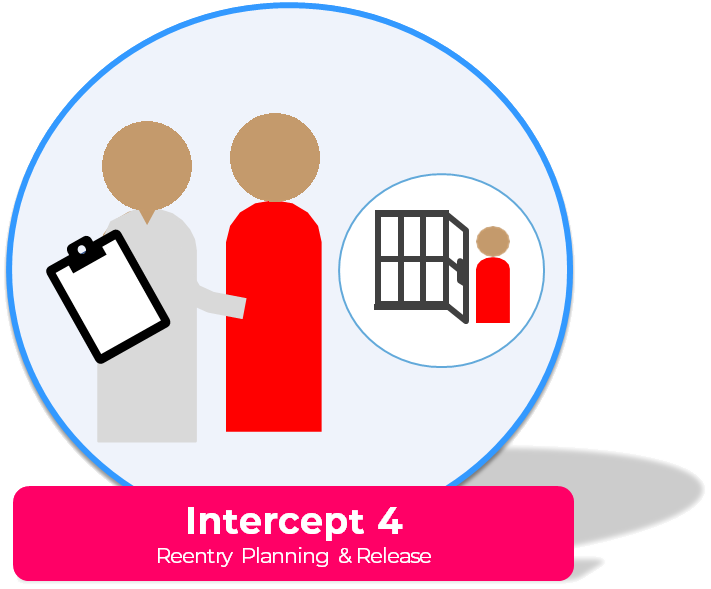
Reentry Services
Intercept 4
Reentry Planning & Release

What Is Intercept 4?
Intercept 4
Whether criminally convicted or not, if individuals are taken into custody, at some point they will be released back into society. Intercept 4 addresses the continuity of care between correctional facilities and community behavioral health providers as people return to their communities. It concludes when someone is linked to ongoing community supports.
LA County Initiatives (not exhaustive)
- Men’s Central Jail Closure & Effort to Divert Mental Health/SUD Segments
- Returning Home Well
Reentry Services
Intercept 5
Supervision in the Community
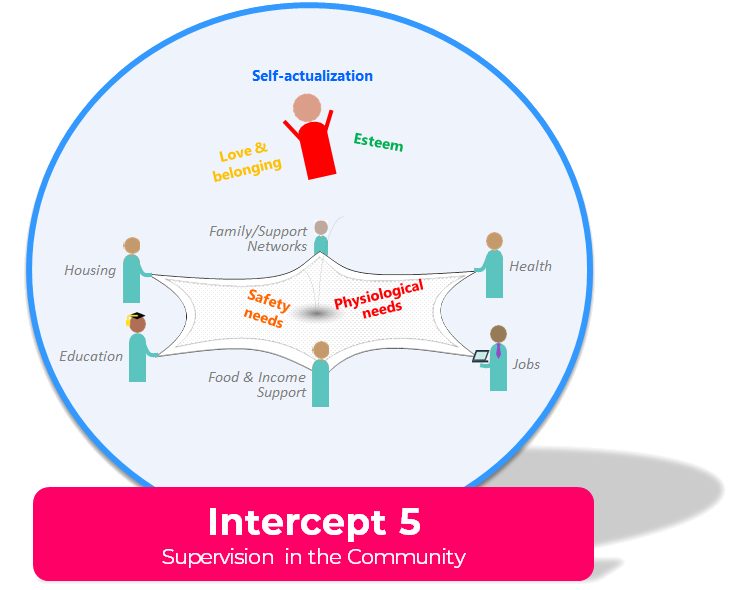
What Is Intercept 5?
Intercept 5
Intercept 5 focuses on the person’s continued and permanent access to resources, after the transition from jail or prison to the community. This encompasses probation and parole, including such practices as specialized behavioral health caseloads and the use of graduated responses as alternatives to technical violations for problematic behaviors that would traditionally result in jail time.
JCOD Reentry Programs
JCOD provides programming for justice-involved individuals to improve health outcomes, increase self-sufficiency, and reduce recidivism. We partner with community-based and County agencies to provide reentry services that are evidence and data-driven and based on the individual needs of the client. We also support community-based organizations to build their capacity to provide the most effective services and collaborates with County agencies to leverage resources to improve the systems serving the justice-involved population.
Want to see what our team is working on? Click on the tiles below to learn more about JCOD’s reentry programs, and listen to our Reentry team and service providers speak about the work we do:
Explore D.O.O.R.S Program
D.O.O.R.S. is an inclusive creative community of innovative resources for those impacted by the justice system.
Explore RICMS Program
R-ICMS seeks to improve the health and well-being of justice-involved individuals by providing case management…
Explore Reentry Workforce & Education Programs
Programs offer training and paid work experience in sectors that provide career pathway opportunities
Explore Reentry Housing
Learn more about housing programs offered to help support our returning citizens…
Explore POWR Program
The Reentry Division, in partnership with the LA County Probation Department, provides opportunities…
Explore YO! Program
In partnership with the Los Angeles County Probation Department, the Reentry Division has implemented YO!…
Explore LA Training Academy
Wildfire training and career assistance for those facing barriers to employment.
A DAY IN THE LIFE OF A COMMUNITY HEALTHWORKER
Additional videos
Hear members of the JCOD team speak about the work they do…
Reentry Services
Intercept 5
Supervision in the Community

What Is Intercept 5?
Intercept 5
Intercept 5 focuses on the person’s continued and permanent access to resources, after the transition from jail or prison to the community. This encompasses probation and parole, including such practices as specialized behavioral health caseloads and the use of graduated responses as alternatives to technical violations for problematic behaviors that would traditionally result in jail time.
Explore D.O.O.R.S Program
D.O.O.R.S. is an inclusive creative community of innovative resources for those impacted by the justice system.
Explore RICMS Program
R-ICMS seeks to improve the health and well-being of justice-involved individuals by providing case management…
Explore Reentry Workforce & Education Programs
Programs offer training and paid work experience in sectors that provide career pathway opportunities
Explore Reentry Housing
Learn more about housing programs offered to help support our returning citizens…
Explore POWR Program
The Reentry Division, in partnership with the LA County Probation Department, provides opportunities…
Explore YO! Program
In partnership with the Los Angeles County Probation Department, the Reentry Division has implemented YO!…
Explore LA Training Academy
Wildfire training and career assistance for those facing barriers to employment.
Additional videos
Hear members of the JCOD team speak about the work they do…
Other Programs
Jail Closure Implementation Team
The Los Angeles County jails are filled with people struggling with homelessness, poverty, mental illness and addiction. The justice system is ill-equipped to respond to these human conditions, resulting in far too many people cycling in and out of jail, with no benefit to public safety—instead of getting the support they need to lead healthy and productive lives.
Guided by the Care First, Jail Last vision, the Jail Closure Implementation Team’s (JCIT) goal is to safely and methodically depopulate and eventually close Men’s Central Jail by expanding the continuum of care for individuals being diverted or released from jail, while ensuring public health and safety. This work relies on close collaboration with County departments, other Board initiatives, and vested community stakeholders.
Jail Closure Implementation Team
The Los Angeles County jails are filled with people struggling with homelessness, poverty, mental illness and addiction. The justice system is ill-equipped to respond to these human conditions, resulting in far too many people cycling in and out of jail, with no benefit to public safety—instead of getting the support they need to lead healthy and productive lives.
Guided by the Care First, Jail Last vision, the Jail Closure Implementation Team’s (JCIT) goal is to safely and methodically depopulate and eventually close Men’s Central Jail by expanding the continuum of care for individuals being diverted or released from jail, while ensuring public health and safety. This work relies on close collaboration with County departments, other Board initiatives, and vested community stakeholders.

